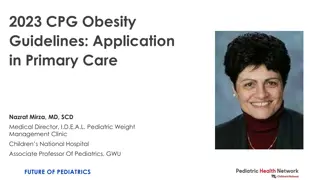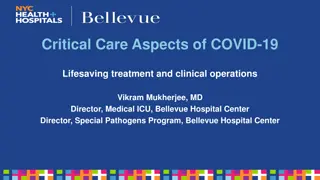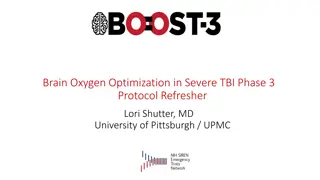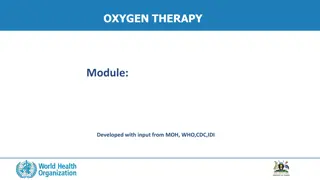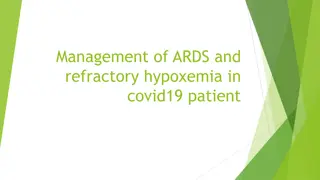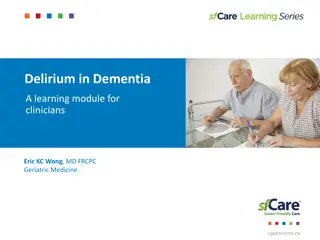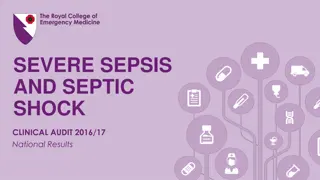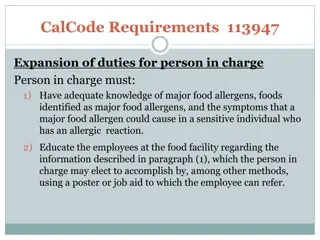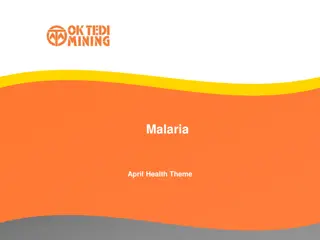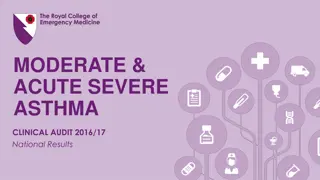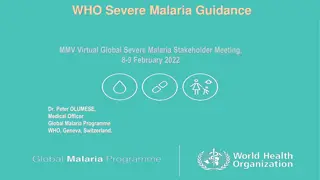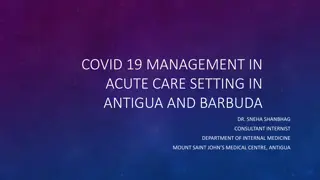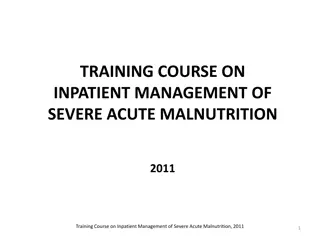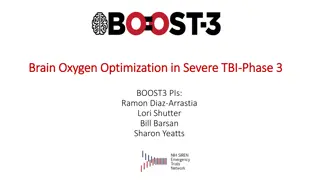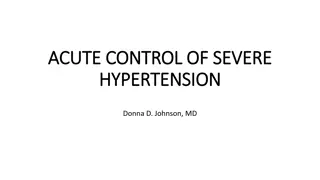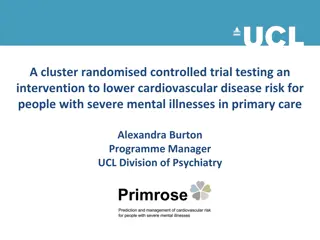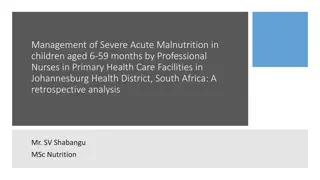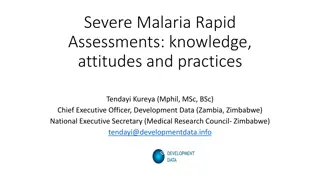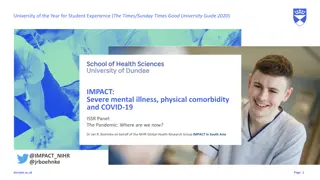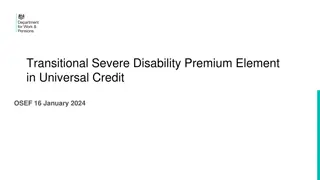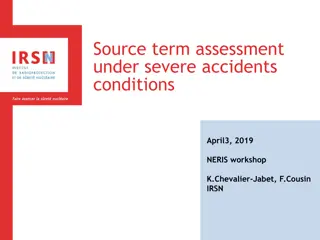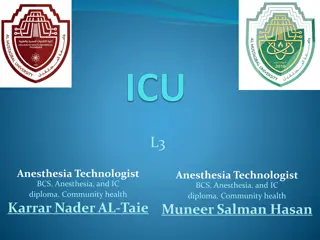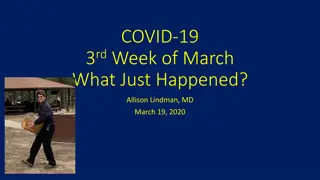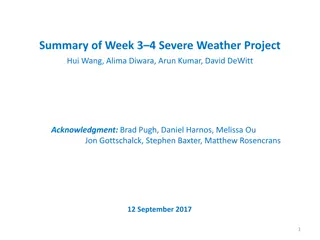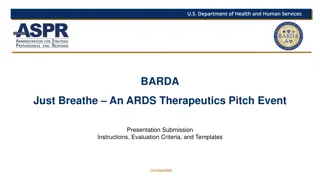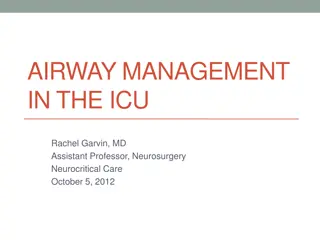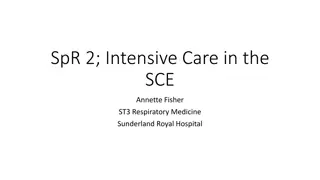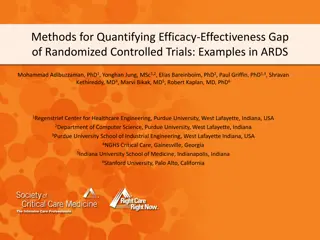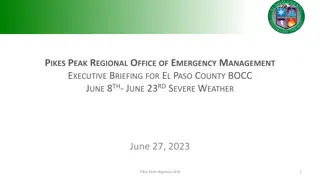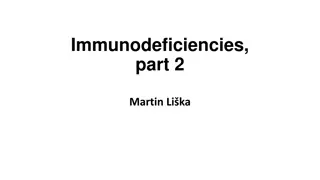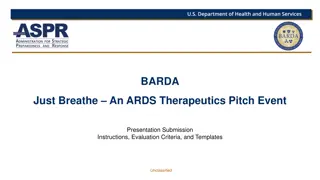2023 CPG Obesity Guidelines: Application in Primary Care and Impact on Pediatric Health
Application of the 2023 CPG Obesity Guidelines in primary care is crucial due to the increased prevalence of obesity among children, with 19% affected in the US. This guideline update is necessary as the last guidelines were published in 2007 and there is now more data available, including RCTs and
5 views • 23 slides
Case Conference - ARDS and Hypoxemic Respiratory Failure in 34-Year-Old Male
34-year-old male transferred to MICU for hypoxemic respiratory failure with a history of asthma, recent respiratory symptoms, and suboptimal response to previous antibiotic treatment. Initial labs and imaging findings indicate a complex differential diagnosis involving multiple organ systems. Furthe
3 views • 24 slides
Best Shoulder Replacement Surgery Hospitals in India
Best Shoulder Replacement Surgery Hospitals in India\nA prosthetic implant during surgery changes an unhealthy or damaged shoulder joint. Patients with severe shoulder arthritis or other shoulder joint issues frequently undergo this treatment to relieve pain and restore mobility.\nOrthopedic surgeon
0 views • 2 slides
Understanding Air Masses, Fronts, and Severe Weather in Earth Science
In Chapter 20 of Earth Science, we delve into the dynamics of air masses, fronts, and severe weather. Meteorologists study the movement and characteristics of air masses to predict weather changes. Air masses, defined by their temperature and humidity, interact at fronts, leading to precipitation an
0 views • 7 slides
Effectiveness of Steroids in COVID-19 Treatment: Insights from Recent Studies
Recent studies delve into the impact of different steroids on mortality and organ support in hospitalized COVID-19 patients. The use of dexamethasone showed a significant reduction in 28-day mortality, especially in patients requiring oxygen support. On the other hand, the REMAP-CAP trial assessed t
1 views • 6 slides
Critical Care Aspects of COVID-19 - Insights from Dr. Vikram Mukherjee, MD
Insights on critical care aspects of COVID-19, including clinical impressions, disease progression, treatment protocols for severe ARDS, management of cytokine release syndrome, and challenges faced in managing patients with COVID-19. Dr. Vikram Mukherjee shares observations and strategies based on
1 views • 30 slides
Brain Oxygen Optimization in Severe TBI - Protocol Summary
In the severe traumatic brain injury (TBI) protocol, intracranial monitors measuring ICP and PbtO2 are placed within 12 hours of injury. Procedures include FiO2 challenges to check PbtO2 reliability and assess cerebral physiology. Challenges involving FiO2, MAP, and CO2 help guide ventilator setting
2 views • 27 slides
Importance of Oxygen Therapy in Managing Respiratory Illnesses
Oxygen therapy is crucial in treating hypoxemia and saving lives, especially in patients with severe acute respiratory infections like COVID-19. This module covers the significance of oxygen therapy, indications for its use, methods to measure blood oxygen levels, and how to titrate oxygen therapy e
2 views • 22 slides
Effective Management of ARDS and Refractory Hypoxemia in COVID-19 Patients
Management of ARDS involves oxygen support and mechanical ventilation along with treating the underlying cause. Lung-protective ventilation strategies such as the OLA approach are recommended. Refractory hypoxemia in COVID-19 patients is challenging, often requiring adherence to ARDS guidelines. Mai
2 views • 28 slides
Understanding Delirium in Dementia for Clinicians
This learning module provides clinicians with insights into the relationship between delirium and dementia, how to distinguish between the two conditions, practical approaches to assessing delirium in dementia patients, treatment implications, and a structured method for delirium detection using cas
0 views • 29 slides
National Audit Results for Severe Sepsis and Septic Shock 2016/17
This presentation outlines the national results of a clinical audit conducted in 2016/17 regarding the management of severe sepsis and septic shock in Emergency Departments (EDs). The audit objectives include benchmarking current performance, facilitating national and peer comparisons, identifying a
0 views • 25 slides
Understanding Major Food Allergens and Anaphylaxis
Major food allergens, including milk, eggs, fish, shellfish, tree nuts, wheat, peanuts, and soybeans, can cause severe allergic reactions in sensitive individuals. Symptoms of food allergies range from mild to life-threatening, with anaphylactic shock being a serious complication that requires immed
0 views • 8 slides
Understanding Malaria: Causes, Symptoms, and Prevention
Malaria is an infectious disease caused by the Plasmodium parasite, transmitted through the bite of a female Anopheles mosquito. There are four types of Plasmodium parasites, with Plasmodium falciparum being the most severe. Malaria incidence globally has seen millions of cases with significant mort
9 views • 14 slides
Clinical Audit Results of Moderate to Acute Severe Asthma in EDs 2016/17
This clinical audit presentation showcases the national results of how Emergency Departments (EDs) are performing against the established audit standards for moderate to acute severe asthma in the year 2016/17. The objectives of the audit were to benchmark current performance, enable national and pe
1 views • 36 slides
Results and Learnings from a Community-Based Severe Malaria Project in Rural Zambia
Zambia's community-based severe malaria project has successfully scaled up the use of Rapid Access to Treatment (RAS) strategy, resulting in improved access to malaria case management services. Key success factors include training over 16,500 Community Health Workers (CHWs) since 2017, community mob
0 views • 9 slides
Severe Malaria Treatment Guidelines by WHO
Severe malaria requires prompt diagnosis and treatment to prevent death and complications. The main focus is on achieving therapeutic concentrations of effective antimalarials quickly. Management involves clinical assessment, specific antimalarial treatment, addressing complications, and supportive
0 views • 18 slides
Management of COVID-19 in Acute Care Setting in Antigua and Barbuda by Dr. Sneha Shanbhag
This presentation by Dr. Sneha Shanbhag, a consultant internist at Mount Saint John's Medical Centre in Antigua, outlines the COVID-19 management strategies in the acute care setting. The presentation covers case severity breakdown, hospital admission guidelines, therapeutic management for mild to s
0 views • 10 slides
Managing Physical Health in Severe Mental Illness with a Focus on Diabetes
This educational material presents a comprehensive slide set designed to aid in the management of physical health in individuals with severe mental illness, focusing on diabetes. It includes insights on the challenges faced by healthcare professionals, learning objectives on diabetes management, and
0 views • 14 slides
Inpatient Management of Severe Acute Malnutrition Training Course 2011
This training course focuses on inpatient management of severe acute malnutrition, teaching procedures outlined in the national Community-Based Management of Severe Acute Malnutrition Guidelines. The training aims to reduce case fatality rates significantly and is designed for physicians, senior nur
0 views • 9 slides
Brain Oxygen Optimization in Severe Traumatic Brain Injury (BOOST3) Trials Overview
Overview of the BOOST3 trials focusing on brain oxygen optimization in severe traumatic brain injury patients. The trials involve multiple PIs, training sessions, and hands-on ancillary studies. Various design principles and organizational values are emphasized, with grant awards distributed to diff
0 views • 13 slides
Management of Severe Hypertension in Maternal Health
Learn about the critical management of severe hypertension in maternal health, including the acute control of hypertension, risks of maternal deaths, guidelines for treating severe hypertension, medication recommendations, and essential tips for optimal blood pressure control during pregnancy.
0 views • 6 slides
Cluster Randomised Controlled Trial for Cardiovascular Disease Risk in Severe Mental Illness
A cluster randomised controlled trial is being conducted to test an intervention aimed at reducing cardiovascular disease risk for individuals with severe mental illnesses in primary care settings. Led by Professor David Osborn at UCL Division of Psychiatry, the study is funded by the National Insti
0 views • 21 slides
Management of Severe Acute Malnutrition in Children: A Retrospective Study in Johannesburg Health District
Severe Acute Malnutrition (SAM) in children aged 6-59 months is a critical public health concern in Johannesburg, South Africa. This study retrospectively analyzes the classification and management of SAM cases by professional nurses in primary health care facilities. The research highlights the imp
0 views • 14 slides
Understanding Severe Mental Illness in Mothers: Impacts and Support
Mothers with severe mental illnesses like Schizophrenia face unique challenges in parenting. Support from partners, family, and the community is crucial for their well-being. Despite the difficulties, with proper treatment and support, women with severe mental illnesses can effectively fulfill their
3 views • 23 slides
Severe Malaria Rapid Assessments: Knowledge, Attitudes, and Practices
This presentation discusses severe malaria rapid assessments conducted by Development Data in Uganda and Zambia. The assessments aimed to improve severe malaria case management at community and lower health facility levels. Key findings include knowledge levels among health workers, transitioning kn
0 views • 20 slides
Impact of Severe Mental Illness, Physical Comorbidity, and COVID-19 in South Asia
The research funded by the National Institute for Health Research aims to address the mortality gap and health inequalities faced by individuals with severe mental illnesses in South Asia. The study focuses on improving outcomes for mental and physical multimorbidity, reducing depression and anxiety
0 views • 9 slides
Changes to Transitional Severe Disability Premium Element in Universal Credit
Responding to a High Court judgment, changes are being made to the Transitional Severe Disability Premium Element in Universal Credit. Claimants qualifying for the Severe Disability Premium will receive additional amounts reflecting other disability premiums from legacy benefits. This adjustment aim
1 views • 7 slides
Understanding Source Term Assessment in Severe Nuclear Accidents
Delve into the complexities of source term assessment under severe accidents conditions, focusing on core degradation, containment pressure buildup, radioactive species release, safety systems, iodine-related phenomenology, and assessing the radioactive source term's impact on the environment. This
0 views • 21 slides
Understanding Mechanical Ventilation in Anesthesia Technology
Mechanical ventilation plays a crucial role in assisting patients with breathing difficulties by delivering oxygen and removing carbon dioxide. It involves two primary types: Negative Pressure Ventilation (NPV) and Positive Pressure Ventilation (PPV). NPV helps patients with conditions like chronic
0 views • 19 slides
COVID-19 Update: 3rd Week of March Overview
Key highlights from the 3rd week of March 2020 regarding COVID-19 include the situation in New Mexico, national statistics, global figures, the importance of ventilators in severe cases, transmission rates, and strategies for outbreak control. Information on cases, deaths, government actions, and me
0 views • 29 slides
Severe Weather Project Summary for Week 34
Week 34 of the Severe Weather Project focused on expanding development and evaluation of severe weather potential model guidance. The project aimed to develop experimental forecast tools for severe weather at Week 3-4 time range, utilizing a hybrid model and SCP (Supercell Composite Parameter). The
0 views • 21 slides
BARDA Just Breathe ARDS Therapeutics Pitch Event Details
BARDA is hosting the Just Breathe ARDS Therapeutics Pitch Event to find host-directed therapeutic candidates for an upcoming ARDS clinical trial. The presentation covers submission guidelines, event basics, submission deadlines, evaluation criteria, and more. Drug sponsors are invited to participate
0 views • 23 slides
Interpreting the Use of 'Severe' in NPPF Impact Assessment
Understanding the term 'severe' in the National Planning Policy Framework (NPPF) for impact severity and its implications within the industry. The NPPF guidelines emphasize the importance of addressing significant impacts on the transport network and distinguishing between severe and significant imp
0 views • 14 slides
Airway Management in the NeuroICU: Importance and Strategies
Understanding the crucial role of airway management in the NeuroICU is essential for preventing secondary brain injury and addressing respiratory complications in neurologically-injured patients. This presentation covers the significance of airways, common issues, evaluation techniques, adjuncts, an
0 views • 45 slides
Management of Acute Respiratory Distress Syndrome: Case Study and Diagnostics
A 54-year-old woman post-laparotomy presents with respiratory distress and bilateral infiltrates on CXR. The case raises suspicion for Acute Respiratory Distress Syndrome (ARDS). Diagnostic criteria and potential investigations, such as CT pulmonary angiogram, thoracic USS, echocardiogram, bronchosc
0 views • 17 slides
Critical Care Aspects of COVID-19: Insights from Dr. Vikram Mukherjee, MD
Explore the critical care aspects of COVID-19 discussed by Dr. Vikram Mukherjee, MD, covering clinical characteristics, organ dysfunction, outcomes, inflammatory surge, X-ray findings, and more. Gain insights on the presentation, progression, and management of severe cases, including ARDS, cytokine
0 views • 21 slides
Methods for Quantifying Efficacy-Effectiveness Gap in Randomized Controlled Trials
This research discusses the quantification of the efficacy-effectiveness gap in randomized controlled trials (RCTs), particularly focusing on examples in Acute Respiratory Distress Syndrome (ARDS). It explores the challenges of RCTs, ethical considerations, and the use of observational data for caus
0 views • 8 slides
Severe Weather Executive Briefing - El Paso County - Pikes Peak Region
Severe weather events in the Pikes Peak region of El Paso County from June 8th to June 23rd, 2023, led to significant damages and emergency response activities. The area experienced above-average precipitation levels, severe thunderstorms, floods, and tornadoes, resulting in extensive damages to inf
0 views • 9 slides
Understanding Primary Immunodeficiencies - Part 2
Primary immunodeficiencies are a group of disorders characterized by defects in the immune system. Severe Combined Immunodeficiency (SCID) and related conditions like JAK-3 deficiency, IL-7 R or CD45 deficiency, and Omenn syndrome are discussed in detail, highlighting the genetic basis, clinical man
0 views • 41 slides
Just Breathe: ARDS Therapeutics Pitch Event Details
BARDA is hosting the "Just Breathe: An ARDS Therapeutics Pitch Event" to identify potential host-directed therapeutic candidates for an upcoming phase 2 ARDS clinical trial. The event will take place from July 24-28, 2023, with submission deadlines and evaluation criteria outlined. Drug sponsors are
0 views • 23 slides
